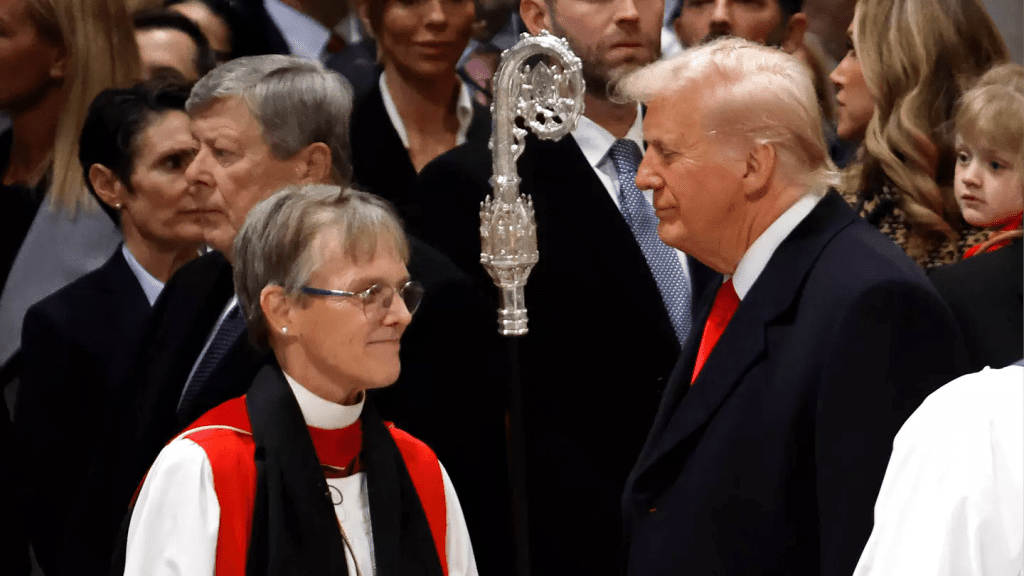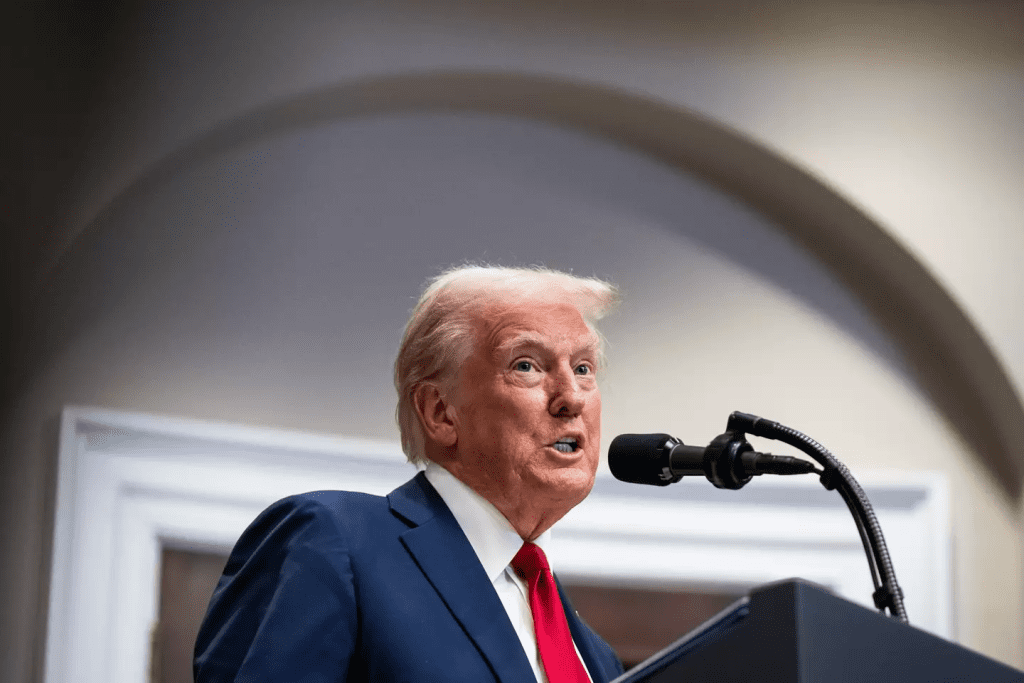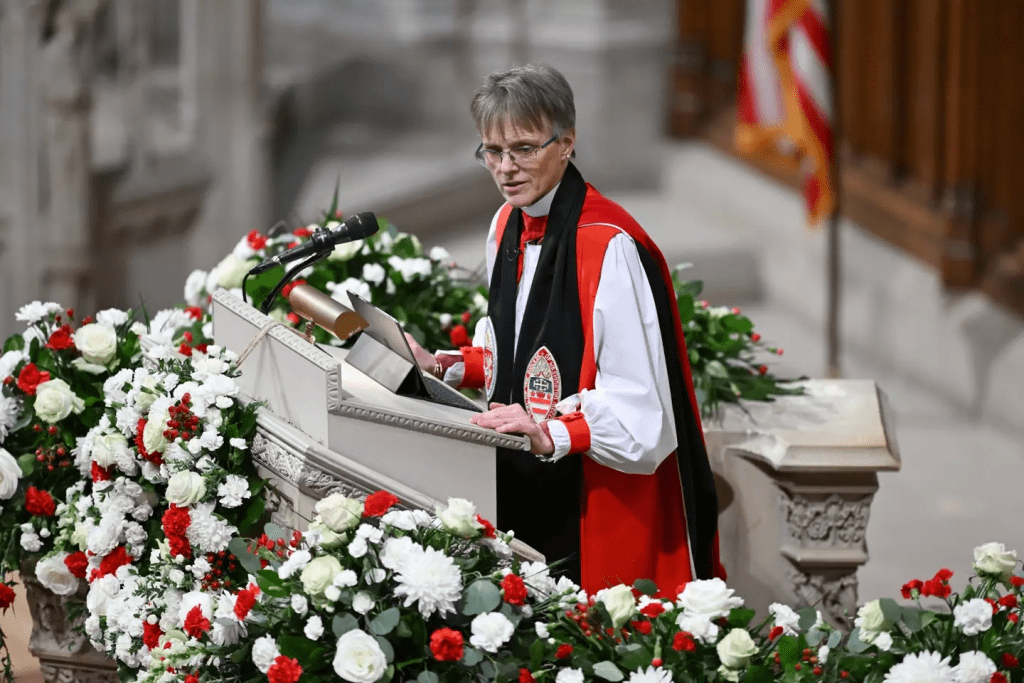Donald Trump, returning to the Oval Office, has stirred controversy once again, this time by demanding an apology from the Bishop of Washington, Mariann Edgar Budde, after she made a heartfelt plea during a church service. The bishop’s request for compassion toward LGBTQ+ individuals and immigrants has reignited discussions about Trump’s policies and stance on inclusivity. Let’s break down what transpired, the policies at the center of the debate, and the wider implications of this conflict.

Trump’s Policies on LGBTQ+ Rights: A Divisive Start
Just days after his inauguration, Trump wasted no time signing executive orders that made his administration’s stance on LGBTQ+ rights abundantly clear. One of the most polarizing orders asserts that there are “only two genders” and directs federal agencies to stop recognizing gender transitions in anti-discrimination laws.
The executive order states:
“Agencies will cease pretending that men can be women and women can be men when enforcing laws that protect against sex discrimination. These sexes are not changeable and are grounded in fundamental and incontrovertible reality.”
Trump’s administration also pledged to:
- End diversity and inclusivity programs that support gender transition at any age.
- Cut funding for hospitals that provide gender-affirming care.
- Rescind federal LGBTQ+ non-discrimination policies in areas like housing, healthcare, and employment.
These moves signal a significant rollback of protections for transgender and nonbinary individuals, sparking backlash from LGBTQ+ advocates and civil rights organizations.
Bishop Mariann Edgar Budde’s Plea for Mercy
During a church service on January 21, Bishop Mariann Edgar Budde made an emotional appeal to Trump, asking for compassion for vulnerable communities. Her remarks were not only a plea but also a reflection of the concerns many Americans share about the potential consequences of these new policies.
She addressed Trump directly, saying:
“In the name of our God, I ask you to have mercy upon the people in our country who are scared now. There are gay, lesbian, and transgender children in Democratic, Republican, and Independent families, some who fear for their lives.”
Her plea extended beyond LGBTQ+ communities, highlighting the struggles of immigrants who labor in essential industries without documentation:
“The people who pick our crops, clean our office buildings, and work the night shifts in hospitals—they may not have the proper documentation, but the vast majority of immigrants are not criminals.”
Budde’s appeal underscored the fears many marginalized groups face under Trump’s policies, presenting a human-centered argument for compassion and understanding.

Trump’s Fiery Response
In true Trump fashion, the former president responded to Bishop Budde’s comments with an early-morning post on Truth Social. His remarks were sharp and direct, accusing the bishop of politicizing the service and lacking professionalism.
“The so-called Bishop who spoke at the National Prayer Service on Tuesday morning was a Radical Left hard line Trump hater. She brought her church into the World of politics in a very ungracious way.”
Trump’s critique didn’t stop there. He accused Budde of ignoring what he described as a “crime wave” caused by illegal immigrants, adding that her statements were “nasty in tone” and “not compelling or smart.” He concluded by demanding an apology from Budde and her church, claiming their remarks were inappropriate and uninspiring.
The Broader Impact of Trump’s LGBTQ+ Policies
Trump’s return to office and his immediate focus on rolling back LGBTQ+ rights have reignited debates about inclusivity in government policies. Critics argue that these actions send a chilling message to LGBTQ+ individuals and their families, reinforcing systemic discrimination.
- Healthcare Disparities: By cutting funding to hospitals offering gender-affirming care, the administration risks limiting access to critical medical services for transgender individuals.
- Housing and Employment Discrimination: Revoking non-discrimination policies could expose LGBTQ+ individuals to unfair treatment in areas like housing and the workplace, reversing years of progress.
Advocates emphasize that these measures disproportionately affect vulnerable groups, particularly transgender youth who already face higher rates of bullying, mental health challenges, and homelessness.

A Call for Compassion or a Political Statement?
Bishop Budde’s comments have sparked a broader conversation about the role of faith leaders in addressing social and political issues. Critics of Trump’s response argue that her remarks were not political but rather a moral appeal rooted in religious values of compassion and empathy.
On the other hand, Trump’s supporters see her comments as an attack on his administration, aligning with what they perceive as a broader bias against conservative values. This clash highlights the growing polarization in American society, where even calls for mercy are viewed through a partisan lens.
What This Means for America Moving Forward
The dispute between Trump and Bishop Budde is emblematic of the larger cultural battles shaping the nation. Trump’s policies signal a sharp turn toward traditionalist views, while voices like Budde’s call for greater inclusivity and compassion.
For many, this moment serves as a reminder of the power of advocacy, whether it comes from religious leaders, activists, or everyday citizens. As policies affecting marginalized groups continue to take shape, the need for dialogue and understanding becomes ever more critical.
Conclusion
Donald Trump’s demand for an apology from Bishop Mariann Edgar Budde has brought issues of LGBTQ+ rights and immigration to the forefront once again. While his administration moves forward with policies aimed at reshaping America’s stance on gender and inclusion, voices like Budde’s remind us of the importance of empathy in leadership.
This clash isn’t just about politics—it’s about the heart of what kind of society America aspires to be. Whether one agrees with Trump’s policies or Budde’s plea, one thing is clear: the conversations sparked by this moment will continue to shape the nation’s future.